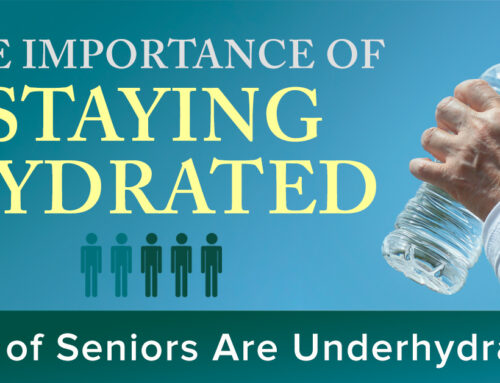Drink Up – The Importance of Staying Hydrated
As the temperature rises, so does the risk of dehydration – especially among older adults.
“My mom experienced dehydration just a few weeks ago,” said Debbie Hilt, a consultant working with the HomeCare Advocacy Network (HCAN). “I encourage her to drink a lot of water, especially during the summer months, but she thinks one bottle a day is more than enough. She tells me she’s not thirsty, but I know she’s also hesitant to drink a lot of water, because it’s getting harder and harder for her to get to and from the bathroom.”
Older adults are more susceptible to dehydration because they:
- Naturally have less water in their bodies
- Are less sensitive to feelings of being thirsty
- Have a decreased ability to keep fluid levels in balance
- Have less efficient kidneys, which causes urine to contain more water
- Often take medications that cause side effects, such as excessive sweating
A UCLA study found that 40% of seniors might be chronically under-hydrated. That can easily lead to dehydration and cause a variety of serious health problems, including urinary tract infections, falls, kidney stones and more.
How do you know if your older loved one may be in danger of dehydration?
“With my mom, it was the confusion,” Hilt said. “She called me at 7:30 in the evening wondering why the morning news wasn’t on – she was absolutely certain it was 7:30 in the morning, and I couldn’t convince her otherwise. I thought maybe she was having a stroke, but after a trip to the emergency room and a lot of tests, the doctors determined it was dehydration.”
Other symptoms include:
- Dry mouth
- Dark colored or a very small amount of urine
- Fatigue
- Dizziness
- Muscle cramps
- Headache
- Weakness
- Sleepiness or irritability
- Low blood pressure
- Difficulty walking
- Fast, but weak pulse
- Wrinkled skin with no elasticity
- Breathing faster than normal
- Sunken eyes
To avoid dehydration, experts recommend:
- Making a hydration schedule – especially if there are mobility issues. The schedule could include drinking water first thing in the morning and after every cup of coffee (because it’s a diuretic). Set reminders throughout the day, and drink an extra glass or two when taking medications.
- Incorporating water-rich foods, like cucumbers, watermelon, oranges, apples and other fruits and veggies into a daily diet.
- Drinking fruit juice, tea, sports drinks, smoothies, etc.
At HCAN, we understand that time and distance can make it difficult for family members to spend as much time as they would like with their senior loved ones, so they may not realize their senior is at risk for dehydration. That’s where we come in. Our professional caregivers are trained to watch for red flags and help our clients live happy, healthy lives – including drinking enough water.
For more information about all of our services, visit hcanthrive.com or call an HCAN-supported agency near you.






